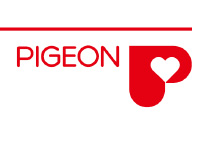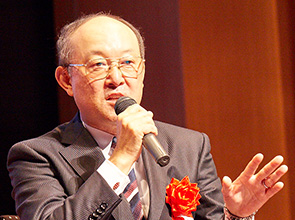Conference on Competitiveness
Interviews with the Prize Winners
Pigeon Corporation, the Baby and Mother Care Products Business
Interviewer: Professor Ken Kusunoki, Hitotsubashi University Graduate School of International Corporate Strategy (Hitotsubashi ICS)
Interviewee: Mr. Shigeru Yamashita, President and COO, Pigeon Corporation
Interviewee: Mr. Shigeru Yamashita, President and COO, Pigeon Corporation

Main Points
- Specializes in products for babies aged 0-18 months
- Finds solutions for childcare concerns
- Launched the "Bonyu Jikkan" baby bottle nipples (SofTouch™ Peristaltic PLUS bottles) in 2010
- Undertakes marketing in collaboration with hospital maternity wards
- Pursues global expansion
- Kusunoki:
- I think by winning this award, Pigeon communicates a message to all of Japan about the power of real monozukuri. [In English, craftsmanship.] It is great that the company is doing well by making products that have value for consumers. First, I would like to ask about nursing bottles, for which your company boasts the top market share in Japan. Judging the quality of a nursing bottle is quite complicated. We cannot get feedback about this product from babies, who are the end users. In fact, if a bottle makes drinking milk too easy, it might adversely impact the child's ability to swallow and drink. Even mothers cannot tell whether a certain nursing bottle is good or not. Please tell us what kind of nursing bottles would be considered "good."
- Yamashita:
- Nursing bottles are used not only with powdered milk, but also when the child is feeding on breastmilk. It is good if the child can drink smoothly, whether it be from the mother's breast or a nursing bottle. But our survey shows that one in every 5-6 babies indicates a dislike of either nursing bottles--that is, the baby drinks well from the mother's breast but not from a bottle--or the breast, meaning it drinks well from a bottle but not from the mother's breast. This is called "nipple confusion." Good nursing bottles help avoid such confusion. Drinking milk is essential for a baby's life and well-being. Therefore, this is a major issue. There are 17 nursing bottle makers in the U.S. But we have received messages of gratitude from users who said that their child had rejected other makers' bottles but easily took to Pigeon bottles. They called our product (the Pigeon nursing bottle) "a life saver."
- Kusunoki:
- With women becoming more and more active outside the home, there is an increasing number of women who want to breastfeed their babies as much as possible when they have time and use formula when they don't. So, does this mean that a good nursing bottle is one that feels like the mother's nipple?
- Yamashita:
- We are working hard to make products that are similar to a breastfeeding mother's nipple, not only in shape but also in function. I think we were able to functionally differentiate the nipples made by our company from those of our competitors because we have researched how babies actually drink milk, and found three key factors of the sucking process.
- Kusunoki:
- Your "Bonyu Jikkan/SofTouch" brand holds the top market share in Japan. Is it as popular overseas? Do you occupy the top spot in China as well?
- Yamashita:
- Our products are more expensive in China than Japan, yet we are showing a solid sales performance there.
- Kusunoki:
- When customers acknowledge the quality of a product and are willing to buy it at a higher price, this results in profits for the company. This is what the power of monozukuri [in English, craftsmanship] is about.
I've heard that gynecologists play an important role in conveying information to their patients about the qualities and benefits of a product. Please tell us more about this.
- Yamashita:
- We have conducted surveys, not only in Japan but also in China, Brazil, Russia, India and other countries about who has the largest influence on the items a consumer will select when buying childcare products. We discovered that in all the countries, word of mouth was the first source of information, followed by people affiliated with medical institutions and medical professionals. We use the image of medical professionals for our shop displays also.
- Kusunoki:
- Professor Porter talks about positioning. With regard to positioning, essentially, choosing what not to do is more important than choosing what to do.
Pigeon makes products for babies aged 0 to 18 months. What's the reason for leaving out children over 18 months?

Mr. Shigeru Yamashita, President and COO, Pigeon Corporation
|
- Yamashita:
- The biggest reason is that babies all over the world, irrespective of their race or ethnicity, follow more or less the same growth process until the age of 18 months. So, we can use our knowledge and research at a global level. However, if we aim at children older than that, their growth will be influenced by the culture and customs of their country. There are strong global players in that field, and competition is fierce.
- Kusunoki:
- So, in a nutshell, if Pigeon spends its time and money on baby and mother care products for babies up to 18 months and creates good products, then what works in Japan will certainly work in other countries as well. But, in the case of children above 18 months of age, every country has a different lifestyle, which influences the child's upbringing, and what is well received in Japan may not be accepted elsewhere. So, is it correct to say that your craftsmanship in products for babies aged 18 months or younger will yield the maximum gains?
- Yamashita:
- Absolutely. In addition, we have the advantage of competing in a small market segment where there are not many rivals.
- Kusunoki:
- So, you don't plan to make children's clothes or other products for children over 18 months of age?
- Yamashita:
- We did in the past, but it didn't go well. We explored foreign markets also, but couldn't stretch the brand that far. Some places had strong, specialized makers, while others asked for a business model we didn't have. What can be started easily does not always result in success.
- Kusunoki:
- Businesses tend to gain value by solving customers' problems. Your answer seems to suggest that Pigeon's real problem-solving ability lies in the products and segments in which you are currently working. Wouldn't you consider making powdered milk for the same segment of babies up to 18 months of age?
- Yamashita:
- The powdered milk market is a huge and attractive one, and within the company there have been many exciting ideas regarding expansion into powdered milk as well. However, our company supports breastfeeding, so there is no plan to branch out into that field so long as I am the president.
- Kusunoki:
- Does this mean that in the future, the company's growth will take the form of global expansion?
- Yamashita:
- Although overseas markets contribute to about half of our sales, we have no presence in Africa, and the Indian market will turn a profit next year. I think we still have scope for growth.
- Kusunoki:
- If people learn about the product's quality in emerging markets, then it can boost profitability quite a bit. This really shows the underlying strength of craftsmanship, doesn't it?
- Yamashita:
- I'd say most countries are like that, but India is different. In China, we started out by targeting the upper class, which accounts for 20 percent of the population. We are now targeting 50 percent of the population. But in India, our initial target was 3 percent. We revised our target to 10 percent because the first one was too small. In India, everything is completely different from China. The customers, the distribution network... everything is completely different. People in China will buy a good product even if it is expensive, but Indians have a unique sense of value. The good quality of a product does not appeal to them directly. So, we are developing products with Indian consumers in mind. We are also planning to expand into the Central and South American markets.
- Kusunoki:
- So, India is going to become the base for manufacturing. I understand that it must be very challenging, but if Pigeon is able to create new business opportunities in India, success there will fuel the company's future expansion.
- Yamashita:
- Yes, once we settle down a bit in India, we hope to target Africa next.
- Kusunoki:
- I think your company presents a strong example to many Japanese companies of how craftsmanship certainly does contribute to business growth and profits.
Winners PDF
- 第17回 ポーター賞受賞企業・事業 PDF (All of the award company in this year are published. )





